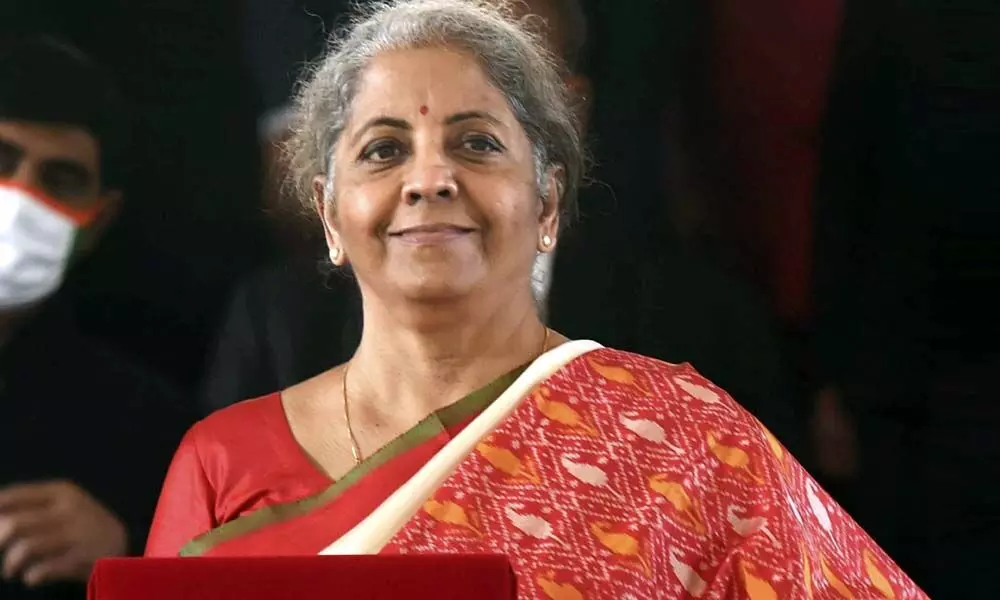Nirmala chants infra mantra
We decided to spend big on infrastructure in this Budget. We attended to the need of the health sector. We have spent, we have spent and we have spent. That's why fiscal deficit has reached this number (9.5%) - Nirmala Sitharaman Finance Minister
image for illustrative purpose

Ups the ante on healthcare; No change in tax rates; enhances FDI in insurance
New Delhi: To pull the economy out of the trough triggered by the Covid-19 pandemic, Union Finance Minister Nirmala Sitharaman on Monday proposed a sharp increase in expenditure on infrastructure, doubling of healthcare spending and raising the cap on foreign investment in insurance in her Budget for the next fiscal.
However, the Budget for the fiscal year beginning April made no changes in personal or corporate tax rates, but raised customs duties on certain auto parts, mobile phone components and solar panels in order to provide impetus to domestic manufacturing. It also imposed an Agriculture Infrastructure and Development Cess (AIDC) on the import of certain items (like apples, peas, lentils, alcohol, chemicals, silver and cotton) to finance agricultural infrastructure and other development expenditure. But its impact on prices has been offset by an equivalent or more reduction in the import duty.
Interest on employees' contributions to PF over Rs 2.5 lakh per year effective April 1, 2021, has now been made taxable. In the previous 2020 Budget, the Finance Minister had capped the tax exemption on employers' contribution to PF, NPS and superannuation funds at an aggregate of Rs 7.5 lakh per year. In a relief to senior citizens, those above 75 years of age with only pension and interest income would no longer have to file income-tax returns, subject to certain conditions.
Delivering her third straight Budget, Sitharaman allocated Rs 5.54 lakh crore for capital creation in the infrastructure sector. This included Rs 1.18 lakh crore for the roads and highways sector and Rs 1.08 lakh crore for railways. The allocation was 37 per cent more than last year. The increased spending is aimed at creating demand in the economy and support job creation.
With just one per cent of GDP being spent on health, she proposed raising of the spending to Rs 2.2 lakh crore next fiscal to help improve health systems as well as fund vaccination drive against coronavirus. "We decided to spend big on infrastructure in this Budget. We attended to the need of the health sector," she told a press conference after presenting the Budget for 2021-22 in Lok Sabha."We decided to give greater impetus to the economy in this Budget."
Additional resources required are targeted to be raised through divestment and monetisation. While Rs 1.75 lakh crore is being targeted from the sale of non-strategic public-sector companies, the government will get Rs 30,000 crore from the new agri Cess.
With government spending more to support the economy during the pandemic that hit revenue collections, the fiscal deficit - the difference between revenue and expenditure - for the current year was put at 9.5 per cent of the gross domestic product (GDP) as against a target of 3.5 per cent. For the next fiscal, the fiscal deficit was projected at 6.8 per cent.
"We have spent, we have spent and we have spent. That's why fiscal deficit has reached this number," she said. She also signalled that the fiscal policy support of the economy will continue for at least three years, with the deficit being brought under 4.5 per cent by FY26.
Officials in her ministry at the press conference explained that the new limit for interest-free PF would hit less than one per cent of the total EPFO base. For the agriculture sector, she maintained the reform momentum such as the extension of farm credit provision to farmers, commodity expansion under 'Operation Green' and extension of Agriculture Infrastructure Fund (AIF) to APMCs.

